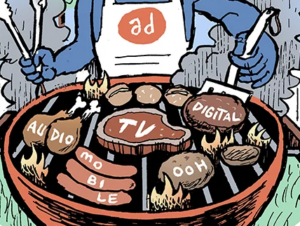Here’s today’s AdExchanger.com news round-up… Want it by email? Sign-up here.
Ben Edelman has returned from past ad exploits and this time he’s found that certain online display ads are being shown on websites – and you can’t see them nor can you see the pages on which they are displayed. Emily Steel covers the story for The Wall Street Journal with quotes from ad networks Burst Media and Tribal Fusion confirming that this sort of cloaked activity is a problem – with Tribal adding that it is starting to work with Edelman. Read more.
Click Fraud Ring Busted
Mike Sachoff of WebProNews says that Anchor Intelligence has helped break up a huge click fraud ring based in China. An Anchor Intelligence spokesperson told Sachoff that “Anchor has identified fraudsters down to the publisher site, IPs used (likely via botnets), and even the names and address of some perpetrators.” Read more. Gizmodo reports that the ring may have been responsible for $3 million in fraudulent clicks in only two weeks. Read Gizmodo’s story.
On Agencies and Ad Networks
Zach Rodgers of ClickZ looks at agencies’ demand-side platform (DSP) businesses and whether this could signal a break from their reliance on ad networks, which may consequently lead to the demise of (or lessen the dependency on) ad networks. Rodgers finds that VivaKi is already testing five clients including American Express and GM on its platform. I still think there will be more ad networks – not less – since DSPs make it easier than ever to become an ad network. We’ll see. Read more on ClickZ.
Local Is 10% Of The Display Pie
ComScore came out with new research last Friday that said local, online display ads make up 10% of all online display inventory. The study looked at four markets – San Francisco, Washington D.C., Atlanta and Chicago – which also showed that locally-focused sites like Citysearch showed nearly triple the results in terms of locally-targeted display ads. Read more.
Brand Marketers Are Gonna Change
Ad Age’s Jack Neff covers a provocative new report by Forrester which says that brand marketers are going to need to change in order to keep pace with the rapid innovation in advertising and media fragmentation. The report “advocates ditching the formal annual budgeting process and upfront media-specific allocations in favor of frequently updated, on-the-fly plans.” Read more.
eXelate Launches Data Platform For Publishers
eXelate announced that it has launched a new platform called “teXi:DM” which “empowers publishers to manage 3rd party data cookies in the same manner they would their media.”
eXelate CRO Mark Zagorski adds in the release, “Publishers can now look at cookie data as a manageable revenue stream on par with media – and eventually just as lucrative.” Read the release.
Predictions On Yahoo!’s Q3
From the Barron’s Tech Trader Daily blog, Eric Savitz writes that Bernstein Research analyst Jeffrey Lindsay’s note on Friday indicates potential at Yahoo! Evidently, Lindsay thinks that Yahoo! will meet street expectations of modest profitability, but that there will be evidence of difficulties in search and display advertising. Read more.
Lazy People Do Not Pay
Rob Leathern has been busy again on the CPM Advisors blog with his best estimate on what the breakout is between revenue earned online per user and on television per viewer. Cobbling together from several industry sources, Leathern estimates that online is driving revenue of between $.50 and $.70 per hour per user. On the other hand, from the lazy 100s of millions of people who are sitting in front of TVs, Leathern estimates that revenue per hour per user is about $.24. Read more.
Angels Bedevil Start-Ups
Jason Calacanis goes off on angel investors who are creating so-called “Angel forums” that require start-ups to pay anywhere from $1,000 to $6,000 for the pleasure of presenting to “the rich.” Read more. Fred Wilson adds his thoughts on the subject on his blog saying that “startup agents” are a problem to – they’re the people that will intro startups to supposed connections for a feed. Read Wilson’s post.
Casale Gets Ebay Canada
Casale Media announced it “will now be handling all ad sales for the [Ebay’s] Canadian site inventory.” Julia Casale-Amorim, CMO of Casale Media tells “Media In Canada” that Ebay was formerly a part of the Casale ad network but had not been involved in any direct sales. Read more.
Digital Media In SF
Zach Coelius of Triggit points to a new Google map that was created to show all the digital media companies in San Francisco. To say that SF is active in digital, is understatement. See the map.














